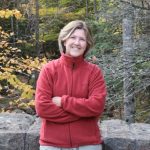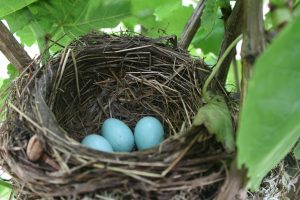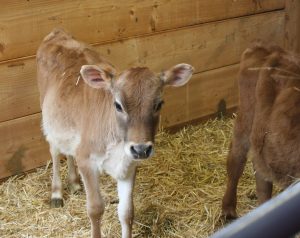By Lisa Graham McMinn
Some mornings Mark and I start the day with a walk up Williamson Road—the country rode that leads away from our home. We’ll pass the hens and beehives on our way out, and our stroll will take us past horses, sheep, cows, alpaca, a donkey, and some friendly dogs. We’ll encounter robins, spotted towhees, finch, sparrows, sometimes a family of partridges that lives in the neighborhood seasonally, and an occasional hawk. I recognize these creatures, along with the people living in the houses along the way, as my neighbors. We belong in a community together that flourishes or not depending on how we humans practice our membership to it. We all will flourish better if we keep the creek and riparian areas around it healthy, and if we hold a good percentage of the land in trees that hold water and keep our soil in place, and cleans our air besides, exchanging oxygen for a good amount of the CO2 our lives expend. Our neighborhood will flourish best if we grow our vineyards, orchards, and vegetable fields in sustainable ways that feed the soil that feeds us all.
Does it feel like a stretch to say that we have a membership in our communities that extends from the soil to the sky and includes all things living in between? Perhaps seeing ourselves as members of broader communities even grounds us deeper in God’s community, encouraging us to live less entitled lives, to use and consume mindfully.
Hold that thought.
I used to ask sociology students if they could make themselves a hamburger without help. Most of them thought so—even if they hadn’t grilled one up before they figured You-Tube videos would help them out. But then I said, “without help means without the internet,” and I followed up by asking where they would get the cow. They realized were having an altogether different conversation than they thought. Without help means figuring out how to obtain, feed, care for, and slaughter a cow, how to grind the meat, make fire, and figure out some sort of way to grill the burger. Putting the burger between a bun raises a whole other set of issues, as does adding condiments—except maybe onion, which one can find growing wild much of the year. By the end of the conversation most of them would settle for a hunk of skewered squirrel or rabbit over an open fire, and self-determination and autonomy of that sort has less appeal.
We belong. However much we want to think we are independent agents, we will not flourish apart from various memberships. Our human memberships generally grant us access to food from the soil that someone planted and harvested, and access to the goods of creatures someone else raised and slaughtered or milked or collected eggs from. As humans we can live in houses built out of trees, consume fossil fuels to keep our lives mobile and varied by food and other stuff shipped across the world to us.
Even if I thought of belonging only for what it does for me, it still bears out that my wellbeing is dependent on the wellbeing of people harvesting coffee beans, the wellbeing of farmers, bakers, dairy workers, of bees, worms, and forests, which all contribute to making my life good.
But membership based primarily on what we get out of it is rather vapid and unsatisfying. The rich life, the good life, the life as God intended it is one lived for the good and wellbeing of others. That my life ends up being more contented, richer, and fuller because of it is the sweet irony of living the servant life that God designed. Acknowledging membership is primarily choosing to live in ways that help the groups to which I belong flourish. It is choosing love and affection over competition and self-seeking. Recognizing that memberships go beyond human communities extends that affection. The truth of the matter is that humans cannot flourish without forming responsible relationships with other parts of God’s creation. Even if motivated by self-interest, embracing our broader membership as citizens of Earth to ensure that our lives flourish will also foster the wellbeing of non-human lives on which we depend.
Perhaps it is okay if self-interest is the initial driving force to be a good neighbor, to live with a desire to see other community members (human and not) flourish so that me and mine continue to do so. But eventually, hopefully, that awareness of dependence on others moves us toward a deep-seeded gratitude from which sprouts a desire for compassion, justice, and the flourishing of all members of this large beautiful earthy community.
All semester long I subtly and not-so-subtly encouraged students (and reminded myself) that we belong to something bigger than ourselves, that we have obligations beyond “being all we can be” and pursuing personal wellbeing and happiness. When we acknowledge our membership into something bigger than ourselves, we can more responsibly participate in a world that functions as God designed it, where we nurture life by eating mindfully, growing food sustainably, using energy wisely, consuming less, and purchasing with an eye toward fostering the wellbeing of neighbors near and far, human and non-human.
At the heart of acknowledging memberships is freedom. We become free from the constraints and burden of self-actualizing as defined by a consumer culture that says more is always better. We become free as we assume the lighter burden to love, to have affection for place, and for living things that share that place with us. We are invited to pay attention and to be filled with gratitude for God who sustains a world (and a food chain) that keeps life moving forward in spite of ways we abuse ecosystems. Perhaps one of God’s strategies for helping Earth flourish in the 21st century is to raise a generation who embrace their membership into all of it—who with counter-cultural voices affirm, I am not what matters most.
Our best response is to live out of affection that roots us in God’s gift of Earth so that we seek to foster the flourishing of life in our daily choices. May we turn away from the glitzy path of a more alienated life and chose the earthy one rich in memberships.
……………………………………………………………………………………………………………….
 Lisa Graham McMinn, Ph.D., is a Professor of Sociology and Writer in Residence at George Fox University. She writes and speaks about gender and sexuality, creation care, food ethics and agriculture. Her books include, The Contented Soul (IVP 2006), Walking Gently on the Earth (IVP 2010), Dirt and the Good Life: Stories of Fern Creek (Barclay Press 2012) and most recently, To the Table: A Spirituality of Food, Farming, and Community (Brazos Press, 2015).
Lisa Graham McMinn, Ph.D., is a Professor of Sociology and Writer in Residence at George Fox University. She writes and speaks about gender and sexuality, creation care, food ethics and agriculture. Her books include, The Contented Soul (IVP 2006), Walking Gently on the Earth (IVP 2010), Dirt and the Good Life: Stories of Fern Creek (Barclay Press 2012) and most recently, To the Table: A Spirituality of Food, Farming, and Community (Brazos Press, 2015).
Lisa also describes herself as a farmer, Quaker, beekeeper, and sometimes potter. Her job, she says, “is to love Creation–to laugh, hope, nurture, and mostly, to pay attention. So I tend tomatoes and fruit trees, nurture bees and chicks, preserve beans, my grandmother’s traditions, and a more simple way of life.”
Lisa lives on Fern Creek, a small CSA (Community Supported Agriculture) farm outside of Newberg, Oregon, where she and her husband Mark tend chickens and bees and grow food for 24 families. Lisa and Mark’s family includes three daughters, and six grandchildren.


